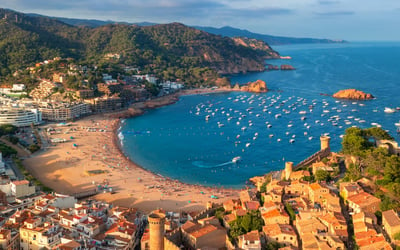Negative press about proposed new taxes, a foreigner-induced housing crisis and over-tourism haven’t been great for Spain’s international reputation in 2025. But away from the politics of Madrid and its regional capitals, the country – thanks largely to its coastline, is still the most popular European destination amongst overseas house buyers.
The halfway point of the year is an opportune time for a review on the property market. We’ve picked out some headline stats from an annual report [1] about market conditions along the Costas. The research comes from the internationally recognised Tinsa Group, Spain’s leading real estate valuer, who are accredited by RICS and the Bank of Spain. In line with Spain’s foreign market, their findings below concentrate on provincial municipalities on the coast.
Rising values
A well-researched property purchase on the Costas remains a sound investment. Average house prices along Spain’s coastline (excluding regional capitals) were up 7.2% in the first quarter of this year compared to 2024. All seaboards registered a rise but the Mediterranean (8.9%) and Spain’s islands (12.8%), which include the Balearics and Canaries, performed best. The Atlantic (Huelva and Cadiz in the Costa de la Luz) and northern coastlines recorded hikes of 6.2% and 5.3% respectively. The average price for a property across all coastal municipalities is €1,848 sq/m (Q1 2025). The northern coast is the most affordable (€1,594 sq/m), and the islands the most expensive €2,481 sq/m.
Quarter of sales nationally
Property purchases along the Spanish coastline totalled 198,995 in 2024, which equates to 28% of the country’s total sales that year (29% in 2023) and an annual increase of 7.2%. Looking closer, municipalities on the Mediterranean attracted 123,525 sales, on the islands 31,611, on the Atlantic 15,582 and in the north 28,277. Total sales nationwide were 715,429.
Second home premium

Coastal houses in Cadaques, Costa Brava
In 56% of coastal areas, properties treated as second or vacation homes demand higher prices than those classed as primary residences. Of the remaining areas, prices are level in 42%. Areas with the largest gap between the two types of property are the Costa Brava, Almeria, Cadiz, Mallorca, Huelva, Alicante and Valencia.
The average price of a second home on the Spanish coast is now estimated to be €2,970 sq/m, which is a 12.1% increase on last year. The largest foreign groups of non-resident second homeowners are Brits and Germans, followed by Western and Central Europeans and Scandinavians.
Concentrated demand
Twenty-two provinces around the whole of Spain have coastline and feature in Tinsa’s analysis. In 15 of these (68%), municipalities by the coast account for more than 50% of the province’s total property sales. In the islands (Balearics and Canaries), Cadiz, Pontevedra (Galicia) and Malaga, this figure is more than 60%.
The volume of property transactions increased in 17 of the 22 coastal provinces last year. The strongest growth was recorded in Castellon (22.1%) on the eastern Mediterranean coast. Otherwise, it was the northern areas that stood out, namely Cantabria (19.3%), Pontevedra (16.2%), Asturias (14.9%), Vizcaya/Biscay (14.7%), Guipuzcoa (14.4%), La Coruña (11.7%). Other notable rises were in Barcelona (13.3%), Valencia (11.1%) and Murcia (11.1%).
Favourite with foreigners
Property purchases in coastal provinces by foreigners grew 2.4% annually last year – they now account for 83% of all of foreign transactions in Spain. The foreign nation that bought the most properties was the UK, followed by Germany, Morocco and France. The EU nations that saw the highest rate of increase in purchases were the Netherlands and Poland, while from outside the EU it was the US and China.
The provinces with the highest number of foreign purchases are Alicante, Malaga and Barcelona. In most provinces, foreign buyers are now also residents. However, in the key provinces of Alicante, Malaga, Balearics, Murcia, Santa Cruz de Tenerife, Girona and Las Palmas (Canaries) the market is still dominated by non-residents.
Most affordable coastal spots
Where do you go for today’s beach bargains? Spain still has coastal municipalities where average property prices are €2,000 sq/m or less, for both houses generally and those classed as second homes. On the Mediterranean coast, these can be found in Tarragona (L’Ametlla de Mar and Alcanar), Castellon (Borriana and Playa de Almenara) and Murcia (La Manga del Mar Menor). Otherwise try Cadiz (Algeciras) on the Atlantic Coast, or head to Northern coastal provinces of Pontevedra (O Grove and Vilagarcia de Arousa), Lugo (Costa de Lugo) and Cantabria (Val de San Vicente and Castro-Urdiales).
Holiday let hot spots
Eighty-five per cent of Spain’s holiday rental properties are located in coastal areas, with 43% condensed into five provinces. The highest concentrations are in the Canaries (14%), Malaga (11%), Alicante (11%) and Balearics (8%).
Source:
[1]: https://www.tinsa.es/en/reports/shore-housing/vivienda-en-costa-2025/
You might also like:




